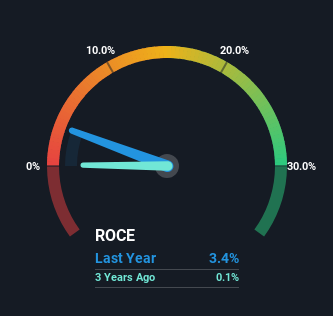- South Korea
- /
- Consumer Durables
- /
- KOSDAQ:A024940
PN Poong Nyun (KOSDAQ:024940) Is Looking To Continue Growing Its Returns On Capital
If we want to find a stock that could multiply over the long term, what are the underlying trends we should look for? In a perfect world, we'd like to see a company investing more capital into its business and ideally the returns earned from that capital are also increasing. Put simply, these types of businesses are compounding machines, meaning they are continually reinvesting their earnings at ever-higher rates of return. Speaking of which, we noticed some great changes in PN Poong Nyun's (KOSDAQ:024940) returns on capital, so let's have a look.
Understanding Return On Capital Employed (ROCE)
Just to clarify if you're unsure, ROCE is a metric for evaluating how much pre-tax income (in percentage terms) a company earns on the capital invested in its business. Analysts use this formula to calculate it for PN Poong Nyun:
Return on Capital Employed = Earnings Before Interest and Tax (EBIT) ÷ (Total Assets - Current Liabilities)
0.034 = ₩1.6b ÷ (₩54b - ₩6.0b) (Based on the trailing twelve months to September 2023).
Thus, PN Poong Nyun has an ROCE of 3.4%. In absolute terms, that's a low return and it also under-performs the Consumer Durables industry average of 6.9%.
See our latest analysis for PN Poong Nyun

Historical performance is a great place to start when researching a stock so above you can see the gauge for PN Poong Nyun's ROCE against it's prior returns. If you'd like to look at how PN Poong Nyun has performed in the past in other metrics, you can view this free graph of PN Poong Nyun's past earnings, revenue and cash flow.
The Trend Of ROCE
PN Poong Nyun has recently broken into profitability so their prior investments seem to be paying off. Shareholders would no doubt be pleased with this because the business was loss-making five years ago but is is now generating 3.4% on its capital. And unsurprisingly, like most companies trying to break into the black, PN Poong Nyun is utilizing 28% more capital than it was five years ago. We like this trend, because it tells us the company has profitable reinvestment opportunities available to it, and if it continues going forward that can lead to a multi-bagger performance.
One more thing to note, PN Poong Nyun has decreased current liabilities to 11% of total assets over this period, which effectively reduces the amount of funding from suppliers or short-term creditors. This tells us that PN Poong Nyun has grown its returns without a reliance on increasing their current liabilities, which we're very happy with.
The Key Takeaway
Long story short, we're delighted to see that PN Poong Nyun's reinvestment activities have paid off and the company is now profitable. Since the stock has returned a staggering 129% to shareholders over the last five years, it looks like investors are recognizing these changes. So given the stock has proven it has promising trends, it's worth researching the company further to see if these trends are likely to persist.
On a final note, we found 3 warning signs for PN Poong Nyun (1 is potentially serious) you should be aware of.
While PN Poong Nyun may not currently earn the highest returns, we've compiled a list of companies that currently earn more than 25% return on equity. Check out this free list here.
New: Manage All Your Stock Portfolios in One Place
We've created the ultimate portfolio companion for stock investors, and it's free.
• Connect an unlimited number of Portfolios and see your total in one currency
• Be alerted to new Warning Signs or Risks via email or mobile
• Track the Fair Value of your stocks
Have feedback on this article? Concerned about the content? Get in touch with us directly. Alternatively, email editorial-team (at) simplywallst.com.
This article by Simply Wall St is general in nature. We provide commentary based on historical data and analyst forecasts only using an unbiased methodology and our articles are not intended to be financial advice. It does not constitute a recommendation to buy or sell any stock, and does not take account of your objectives, or your financial situation. We aim to bring you long-term focused analysis driven by fundamental data. Note that our analysis may not factor in the latest price-sensitive company announcements or qualitative material. Simply Wall St has no position in any stocks mentioned.
About KOSDAQ:A024940
PN Poong Nyun
Manufactures and sells kitchenware products in South Korea.
Flawless balance sheet with acceptable track record.
Market Insights
Community Narratives



